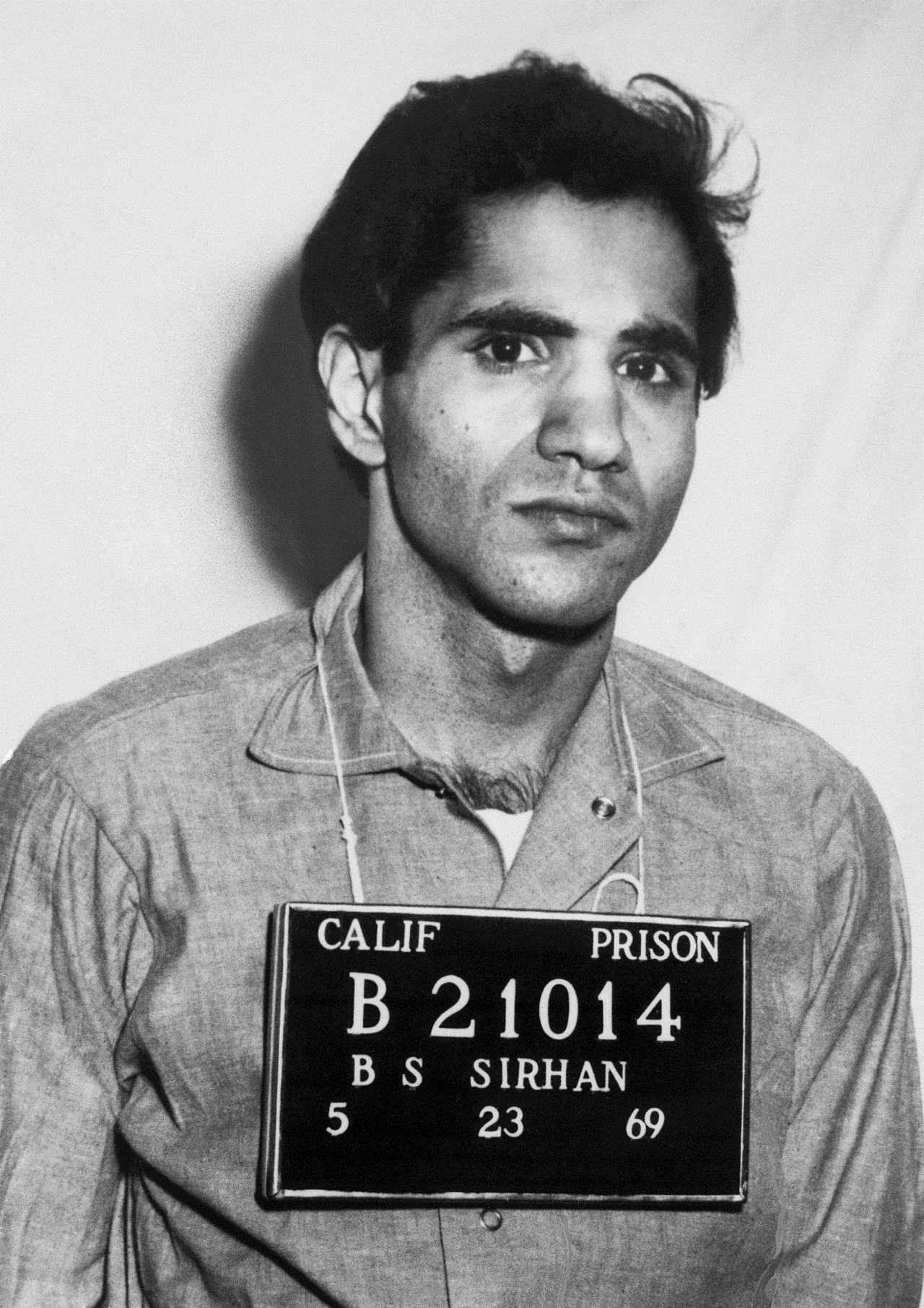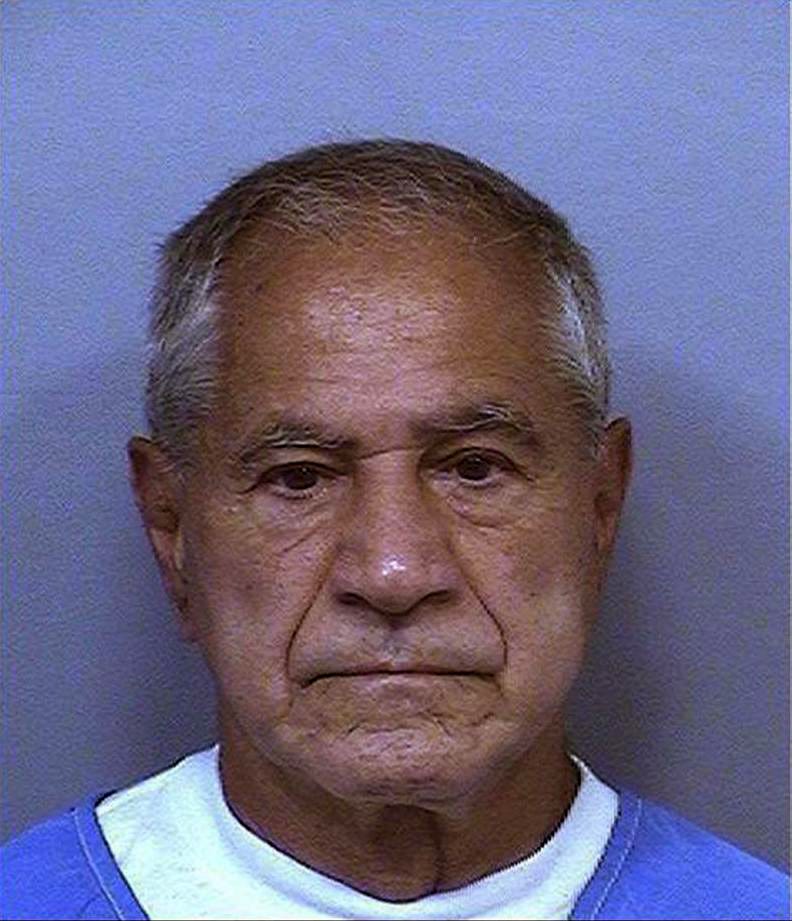By David Talbot, Columnist, The Kennedy Beacon
“I know you didn’t kill my father.”
That’s what Robert F. Kennedy Jr. said to Sirhan Sirhan on December 19, 2017, when he met the man convicted of assassinating Senator Robert F. Kennedy.
RFK Jr.’s father was shot nearly 56 years ago, in the early morning hours of June 5, 1968, after winning California’s Democratic presidential primary. Senator Kennedy’s son shook hands with Sirhan in a visiting room at a state prison near San Diego, talking with Sirhan for over two hours. The historic meeting was arranged by Sirhan’s then attorney, Laurie Dusek.
Sirhan knew that the younger Kennedy was an experienced lawyer and he wanted to plead his innocence. But by then RFK Jr. had already studied the case thoroughly and had made up his mind.
“They talked about a lot of things,” recalls Dusek, who attended the meeting. “Sirhan kept apologizing. Finally, Bobby said, ‘You don’t need to say you’re sorry.’ Sirhan said, ‘But if I hadn’t been there…’ He has guilt. He’s a very intelligent person. Not a violent person at all.”
Later, Kennedy called Sirhan “very sweet.”
In December 2021, four years after meeting with Sirhan, Kennedy agreed with the California parole board and called for his release – the truth, he stated, that surmounts his family’s trauma. “The pain that we all feel from my father's death should not prevent us from pursuit of the truth,” he wrote in a San Francisco Chronicle opinion column. “I firmly believe the idea that Sirhan murdered my father is a fiction that is impeding justice.”
But California Governor Gavin Newsom, blowing with the prevailing wind, overrode the state parole board, insisting Sirhan was a dangerous assassin. Now 80, Sirhan – who has spent most of his life behind bars – is again seeking parole in August. His release is again opposed by Governor Newsom, who prefers political expediency over evidence.
As any credible researcher who studies Robert Kennedy’s assassination discovers, Sirhan was framed for the murder. He’s the Lee Harvey Oswald of the RFK case.
After delivering his victory speech, RFK was making his way from a ballroom stage to meet the press, when an explosion of gunfire erupted in the kitchen pantry of Los Angeles’s Ambassador Hotel. By the accounts of eyewitnesses and experts, Sirhan was several feet in front of Kennedy, and not in a position to fire the fatal shot, which was delivered at point-blank distance to the rear of the senator’s skull. Sirhan’s gun held eight bullets, but there was evidence that at least 12 shots were fired that night, proof there was at least one other gunman. “Thus I have never said that Sirhan killed Robert Kennedy,” concluded Dr. Thomas Noguchi, the coroner who performed the autopsy on the slain leader.
Noguchi and others who closely examined the case speculated that Sirhan, who appeared to be in a trance or hypnotic state that night, was a decoy for a second shooter who assassinated Kennedy. The true guilt of Sirhan, who was 24 the night Kennedy was shot, is that he was easily hypnotized and victimized -– the fall guy in a plot he couldn’t comprehend.
So if Sirhan Sirhan didn’t kill Robert F. Kennedy, who did?
The prime suspect for organizing the assassination of Senator Kennedy is Robert Maheu, a private investigator whom the CIA employed to recruit Mafia leaders to kill Cuban leader Fidel Castro. Maheu also was involved in other plots, including lethal ones, ordered by the CIA, which is legally banned from operating on U.S. domestic soil.
I interviewed Maheu for my 2007 book, Brothers: The Hidden History of the Kennedy Years, at his Las Vegas home, as golf balls from an adjacent course occasionally plunked off his roof. I found the shadowy investigator, who died in 2008, to be a charming snake. He made no secret that he hated JFK and RFK.
“As far as I’m concerned,” Maheu told the Church Committee in 1975, “those volunteers who got off the boats (at Cuba’s Bay of Pigs) that day (in April 1961) were murdered.”
Besides serving the CIA, Maheu was also running Howard Hughes’s Las Vegas empire at the time of the RFK assassination, a lucrative position (Hughes paid him an annual salary of $500,000, over $4.5 million today) that cemented his ties to the spy agency, which used Hughes business accounts as a piggy bank. Maheu's executive role in Hughes's Las Vegas operation also allowed him to keep doing business with organized crime figures.
As Lisa Pease, author of A Lie Too Big to Fail, a 2018 book on the assassination of Robert F. Kennedy, wrote, Robert Maheu “seems the obvious choice” for the organizer of the RFK plot, ticking off all the points for the “required comprehensive planning” that was necessary to pull off the assassination and to pin it on the hapless Sirhan.
“Maheu had friends in the deepest, darkest corner of the CIA, the Office of Security, the component that ran the mind control programs and bugged CIA employees to prevent them from leaking to others,” Pease observed. “He was extremely well-connected at the highest realms of power in the country, had access to nearly unlimited funds, and had provable experience in running assassination plots for the CIA. He had mob contacts through (Johnny) Roselli… Maheu also had friends in the LAPD and (Los Angeles County) Sheriff’s office. He had run CIA operations in conjunction with the LAPD in the past.”
Maheu and his Las Vegas security chief Jack Hooper, who ran the Bel Air Patrol and other private security firms, also employed Thane Cesar, the guard who led RFK into the Ambassador Hotel pantry that fateful night and who discharged his revolver, which wasn’t later tested by Los Angeles police inspectors.
John Meier, a top aide to Howard Hughes from 1966 to 1970, was stunned to hear Cesar’s name on a news report after the RFK assassination, because he connected him to Maheu and Hooper. But according to Meier, Maheu sternly warned him to never mention Cesar’s name or his connection to Bel Air Patrol.
“Bob Maheu called and told me to come over to his (Las Vegas) home at 8:30 P.M. that evening and I did,” Meier wrote in what he called a June 14, 1968 journal entry. Meier read from the journal to Pease and me at his Vancouver home in 2015 – an entry that Pease later quoted in her book. “He was furious and wanted to know why I was checking up on Thane,” Meier wrote. “I was stunned at his anger and he said to me that if I kept discussing this matter, he would see that I was no longer around the Hughes operation.”
Pease and other RFK assassination researchers have speculated that Cesar played a key role in the operation, either holding Kennedy in place for the assassin’s bullet or firing the gun that killed him. Cesar, who died in the Philippines in 2019, maintained his innocence until the end. But he never sat for deep questioning, demanding payment for an interview.
Maheu also declared his innocence in the RFK assassination, calling Meier a “14-carat phony” during my interview with him. Maheu pointed out that Meier served prison time for forgery and was accused of skimming money from Hughes’ mining deals. (Meier claims he was framed by powerful U.S. officials.)
But, as I wrote in my 2015 book The Devil’s Chessboard, which explored CIA involvement in the Kennedy assassinations, “it was Maheu himself who was the biggest crook in (Hughes’s) Nevada organization. Hughes told the press after fleeing Las Vegas in 1970, Maheu was a ‘no-good, dishonest son of a bitch (who) stole me blind.’”
As I wrote, while running Hughes’s gambling casinos and other operations in the desert, Maheu “had made sweetheart deals with mobsters and allowed the CIA to pay off politicians with Hughes cash and to exploit the Hughes corporate empire as a front for spy activities.”
Maheu might have hung out with mobsters. But he was first and foremost a spook. And a proud assassin – at least he was honest about his underworld conspiracies to kill Castro, another threat (as he saw it) to U.S. interests.
There was a flurry of media interest in Maheu when Pease’s book was published. The CIA might have used Maheu, who was “such a colorful character that it’s widely believed the television show ‘Mission: Impossible’ was based on him and his private investigative agency,” reported the Washington Post in an otherwise thoughtful article about the RFK assassination in February 2019.
But in the last five years, the media has gone back to sleep on Senator Kennedy’s killing. Sometimes it seems only a dwindling few still care about the assassinations of the 1960s, even though they tragically altered the course of American history.
Now and then Robert F. Kennedy Jr. points out the sheer perversity of President Biden denying him Secret Service protection when his father and uncle were assassinated. As has been commented upon many times, Biden even displays a bust of RFK, one of his (safely dead) heroes, in the Oval Office.
What will Biden say if RFK Jr. is shot? Will it register? Will he even care?









Excellent article. I know we all focus on the conspiracy, but we should also pause to reflect on RFK Jr.'s commitment to truth that is so vividly presented here.
Thanks for reading my column -- those of you who did. As I wrote, CIA contractor Robert Maheu and his accomplices should go down in infamy for the assassination of RFK, not Sirhan Sirhan. For many years, I too thought wrongly that Sirhan -- "a Palestinian zealot" -- killed Senator Kennedy. RFK Jr.-- and anyone who examines the case -- knows who was truly behind the assassination of his father.